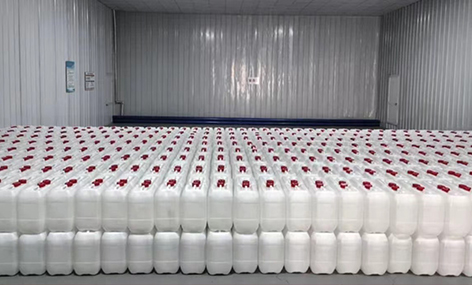
okt . 07, 2024 05:45 Back to list
structural formula of glacial acetic acid
The Structural Formula of Glacial Acetic Acid
Glacial acetic acid, chemically known as ethanoic acid, is a colorless liquid organic compound with a pungent smell, often recognized for its presence in vinegar. The structural formula of glacial acetic acid is represented as CH₃COOH, illustrating its composition and arrangement of atoms. This simple molecule is crucial in various chemical industries and laboratory settings.
The structure of glacial acetic acid can be dissected into two main parts the methyl group (CH₃) and the carboxyl group (COOH). The methyl group consists of three hydrogen atoms bonded to a single carbon atom, while the carboxyl group is characterized by a carbon atom double-bonded to one oxygen atom and single-bonded to a hydroxyl group (–OH). This unique configuration contributes to acetic acid's properties, including its ability to act as a weak acid.
The presence of the carboxyl group in glacial acetic acid is significant because it allows the compound to donate a proton (H⁺) in solution, contributing to its acidity. While acetic acid can be found in diluted form in vinegar, glacial acetic acid refers to its pure, concentrated form, which has a melting point of about 16.6 degrees Celsius. Below this temperature, it solidifies, giving it the term glacial.
structural formula of glacial acetic acid

Glacial acetic acid is not just an everyday kitchen commodity. It plays a vital role in various industries. It is extensively used in the production of synthetic fibers, plastics, and food preservatives. Moreover, it acts as a solvent and a reagent in chemical reactions, making it indispensable in the laboratory for analytical chemistry.
Despite its usefulness, safety precautions are paramount when handling glacial acetic acid. Its concentrated form can be corrosive and cause burns if it comes into contact with skin or eyes. Therefore, proper protective equipment, such as gloves and goggles, should be worn during its handling.
In summary, the structural formula of glacial acetic acid (CH₃COOH) encapsulates a compound of profound significance in both household and industrial contexts. Its distinctive structure imparts unique chemical properties, making it a fundamental substance in various applications. As science continues to evolve, understanding compounds like glacial acetic acid becomes increasingly important for advancements in chemical research and industrial processes.
